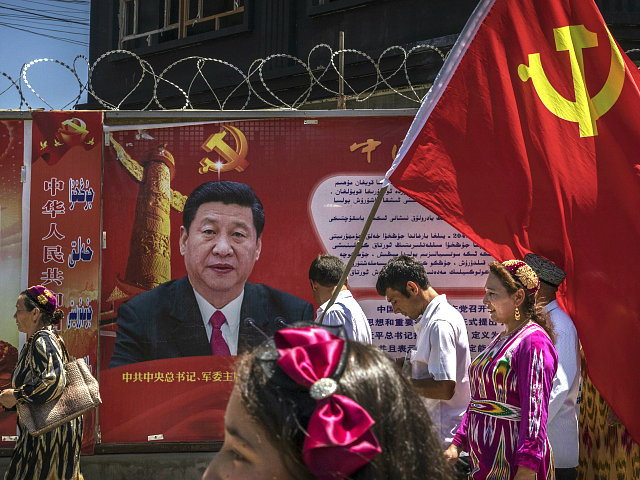Foreign Secretary Dominic Raab announced that the United Kingdom is formally ending the extradition treaty between the UK and Hong Kong, as well as hinting that the UK may impose sanctions over the mass internment of Uyghur Muslims in concentration camps in Xinjiang.
On Monday, Mr Raab announced in the House of Commons that the British government will revoke its extradition treaty with Hong Kong, as well as extending the arms embargo to the city, which has applied to mainland China since the 1989 Tiananmen Square Massacre. The ban will include crowd control equipment such as shackles and smoke grenades, that have been used against pro-democracy protesters in Hong Kong.
Mr Raab said that the national security law in Hong Kong represented “a clear and serious violation of the UK-China joint declaration and with it a violation of China’s freely assumed international obligations.”
Raab told MPs he was particularly worried about sections of the law that allow mainland authorities to take control of certain cases, and the “potential reach of the extra-territorial provisions”.
The Foreign Secretary that since national security law may allow the Chinese Communist Party to assume jurisdiction over cases in Hong Kong, the government has decided to “to suspend the extradition treaty immediately and indefinitely”, adding that the treaty will not be restored “unless and until there are clear and robust safeguards which are able to prevent extradition from the UK being misused under the national security legislation.”
Amid growing concern about the concentration camps in Xinjiang — that the Chinese Communist Party has been reportedly been interning Uyghur people for years — the Foreign Secretary has also suggested that the United Kingdom may impose sanctions on the regime in Beijing, accusing the CCP of “gross and egregious” human rights abuses.
“We are working with our international partners on this. It is deeply, deeply troubling. The reports of the human aspect of it — from forced sterilisation to the education camps — are reminiscent of something we have not seen for a long, long time,” Raab told the BBC.
When questioned whether the United Kingdom has the geopolitical might to sanction China, Mr Raab said: “People said that about the offer that we’ve made on BNOs (British National Overseas), they’ll say that about lots of things.”
“I’m the one with this government and this prime minister who introduced the Magnitsky sanctions, precisely because we are going to target the individuals responsible for gross human rights abuses,” he added.
The Chinese government denounced the statements as “nothing but rumours and slander”.
On Monday, Chinese Foreign Ministry spokesman Wang Wenbin claimed: “The Xinjiang issue is not about human rights, religions or ethnic groups at all, but about combating violence, terrorism and separatism.”
On Sunday, the Chinese Communist ambassador to the United Kingdom, Liu Xiaoming denied that the Chinese state is committing “ethnic cleansing” on the Uyghur people in Xinjiang, after being shown drone footage — which has been authenticated by Australian security services — showing shaven Uyghur prisoners being loaded onto trains.
“They say one million Uyghur has been persecuted — you know how big, how many populations Xinjiang has? Forty years ago it’s just four, five million, now it’s 11 million people, and people say, you know, we impose, we have a ethnic cleansing — but the population has doubled in 40 years,” Mr Liu claimed, adding that “there’s no such concentration camp in Xinjiang”.
An independent analysis conducted by the Victims of Communism Memorial Foundation found that population growth in the two largest areas of Uyghur Muslims in Xinjiang fell by over 80 per cent between 2013 and 2018.
The research backs up numerous claims from Uyghurs, who have reported widespread sterilisation of women, as well as survivors of Xinjiang concentration camps who said they were subjected to torture, rape, and organ harvesting at the hands of the Chinese Communist Party.
Speaking to Radio Free Asia in September of 2019, one Uyghur woman, Zumuret Dawut, said: “The family planning office gave me a letter and said: ‘Come back on the date stated in the letter and we will offer you a free operation to stop you from becoming pregnant’”.
“On hearing this my husband pleaded, ‘Does she have to undergo this procedure?’ … They said, ‘If you don’t comply it will effect your entry back into the country in the future, also your children’s schooling.’”
“On the day of my operation, I was taken inside the operating room, all I remember was that I was given an infusion. When I opened my eyes … There was no medical staff, doctors or nurses It was a very cold day, and I was covered with only a thin bed sheet,” she noted.
“No one was allowed to visit from outside. When I looked around I heard other women moaning from pain. Once the effect of the anaesthetic wore off, I felt a sharp pain in my lower abdominal.”
Follow Kurt on Twitter at @KurtZindulka

COMMENTS
Please let us know if you're having issues with commenting.